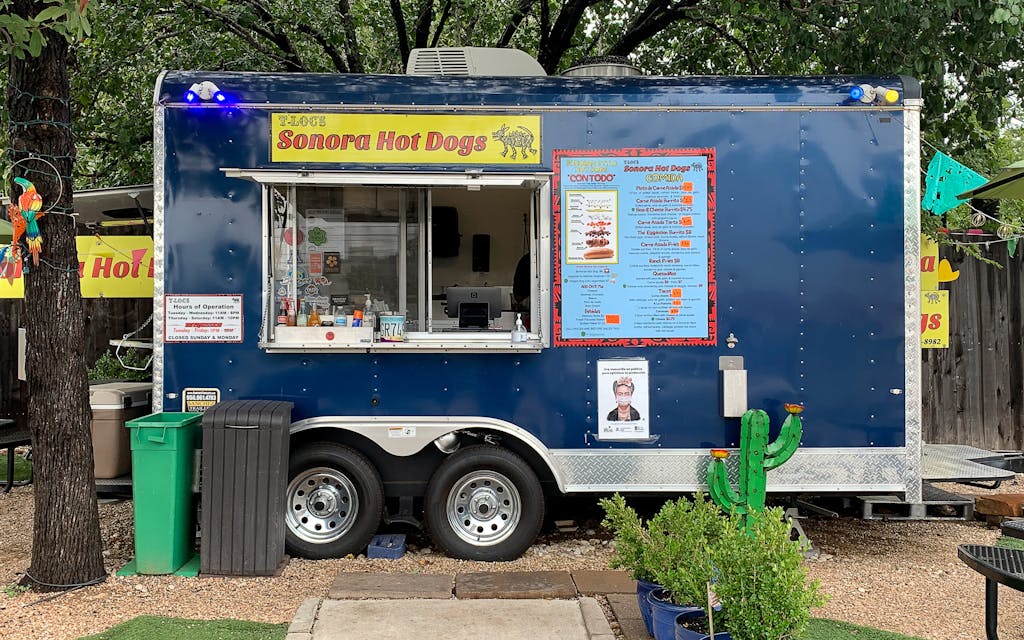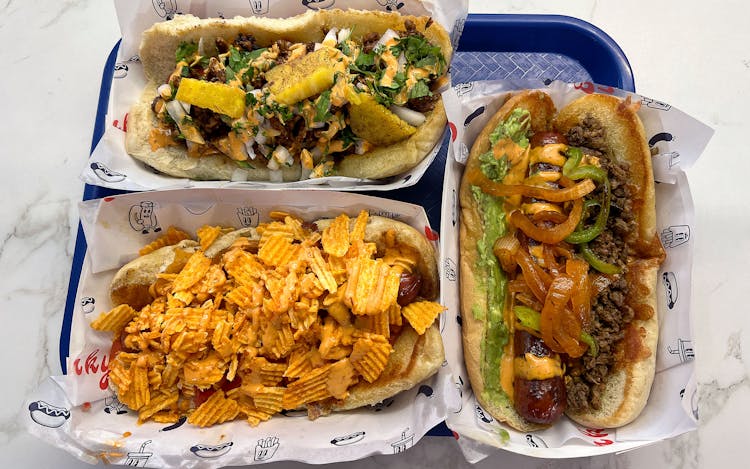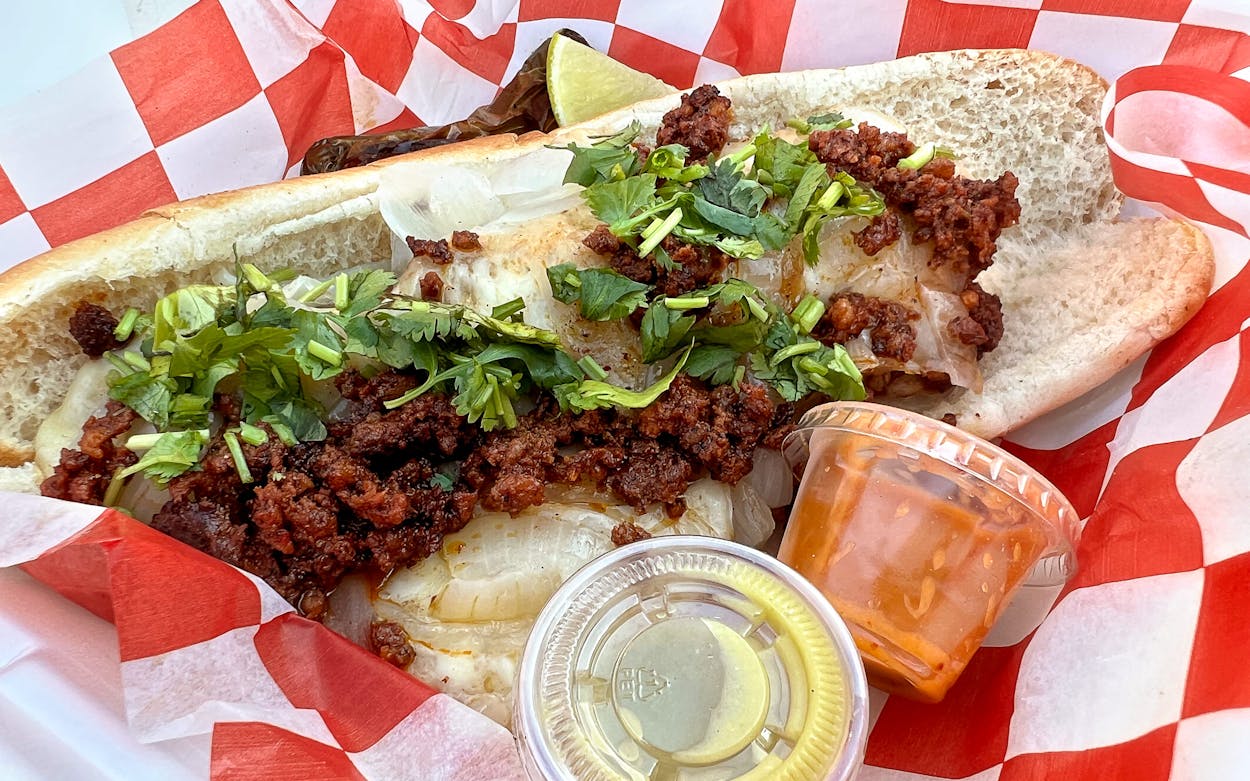There is formal Spanish and then there is everyday, regional Spanish. The former is considered neutral and favors the imperial power on the Iberian Peninsula. The latter is composed of slang and borrowed words that give my native language a sense of wonder and humor. The varying degrees of intensity applied to profanity are a great example. Drinking straws are sorbetos in one part of the Spanish-speaking world, and popote, cañitas, and pajas in other regions. The same applies to food.
The word hot dog is literally translated to perro caliente. No one really calls them that. Rather, they’re doggos, jochos, and—wait for it—hot dogs. Like other foods, hot dogs meet their full potential as a Mexican specialty, with most wrapped in bacon. Variations are found across Mexico, but the border is where some of the most exciting culinary mashups are born, hot dogs among them. They’re extremely popular there.
The handheld snack came to prominence stateside after 1916, when Polish immigrant Nathan Handwerker opened his namesake stand on New York’s Coney Island. Nearly 110 years later, Nathan’s Famous Hot Dogs reigns supreme, thanks in part to its Fourth of July hot dog–eating contest. The food became so popular during the Depression that in 1939, President Franklin D. Roosevelt served it to King George VI of England and his wife Queen Elizabeth (the Queen Mother).
New York doesn’t have a monopoly on the wiener. In Chicago, hot dogs are loaded with yellow mustard (ketchup is sacrilege), chopped white onions, pickled relish or a pickle spear, and a sprinkle of celery salt. Those in the know ask for their orders to be “dragged through the garden” (a.k.a. the works). Across the Midwest, they’re called coneys. This variation is with chili sauce, chopped white onions, and mustard. Its invention is commonly credited to Greek immigrants who passed through New York en route to points west.
But it’s Mexican-style hot dogs that are dearest to my heart. They are as diverse as the country itself and dependably exquisite. Here are some of the great doggos sold across Texas.
Sinaloa Hot Dogs and Mexican Food, Amarillo
The most famous Mexican hot dog is the Sonoran-style frank (more on that later). But the doggo from the neighboring state is just as tasty, and is differentiated with a smear of guacamole or a wedge of avocado and usually cheddar Ruffles and nacho cheese. It’s a healthy slice of the buttery green fruit and queso fresco that caps the specialty at Sinaloa Hot Dogs and Mexican Food in the Panhandle city. 2618 Amarillo Boulevard E., 806-367-8935.

T-Locs Sonoran Style Hot Dogs, Austin
If you’ve had a Mexican hot dog, it’s likely the Sonoran variation. Created in Hermosillo, the capital of Sonora, it is now common across the American Southwest, and especially in Tucson. It’s the gold standard, which is what the T-Locs trailer achieves—twice.
The first is the classic, bolillo-nested, bacon-wrapped frankfurter garnished with raw white onions, sautéed onions, pinto beans, and diced tomato. It’s completed with mustard, mayonnaise, and jalapeño salsa. The mightier Hebrew Sonoran hot dog swaps a regular wiener for a larger Hebrew National frank.
There are five more hot dogs from which to choose. Highlights include the Yaqui, topped with grilled chopped steak and melted Monterey Jack; and the Fresco, dressed simply with guacamole, pico de gallo, and a cucumber sliver. But what distinguishes T-Locs from other Mexican hot dog joints in Texas—and arguably makes it the best—are its rolls. The classic bolillo roll, squishy with a bit of crumb, is regularly shipped from Tucson. Add a lot of spice between bites with the chile guero. 5000 Burnet Road, 512-994-8982.
El Doggy Kitchen, El Paso
There are five locations of the Rodriguez family’s Sun City stalwart—four trucks and one brick-and-mortar. The first outlet, a truck, opened more than a decade ago. Yet considering El Paso’s nearly eternal summer, I recommend the physical restaurant in the Montwood neighborhood. The eponymous hot dog is a classic, and the better El Super Doggy gets a dose of crema and a pile of carne asada. 1841 N. Zaragoza Road, 915-526-1476.
Taco 16th Street West, Odessa
Julio Ramirez’s Permian Basin–based taqueria chain is as vast as the oil-rich region it calls home. The original opened in 2019, and its outposts are as far-flung as San Antonio. The Alamo City location opened in 2021. Hot dogs at all branches are wrapped in bacon and topped with the same fillings you can get in their tacos. My favorite is the alambres hot dog at the original Odessa shop. The wiener is obscured by the messy mix of steak, beef, peppers, melted cheese, and tomatoes. It’s warm, a tad spicy, and the wiener has a great snap with a bun that holds up to its stuffing. 9336 W. Sixteenth, 432-552-8439.


El Chunky, San Antonio
Manuel Rodriguez traveled throughout Mexico noshing on hot dogs before bringing an all-star lineup to his frank shop, El Chunky. His late-night spot butter-toasts each bun for its nine-inch, bacon-wrapped franks. The fajita dog is heavy on the carne asada, and the steak cascades from the bun as you bite into it. The chipotle dog, however, is a spicy choice. Load your frank with crumbled Ruffles for a messy, after-school-esque experience. The al pastor that comes straight from a trompo is an expert touch. 2620 S. Presa, 210-607-3002.
Jochos Don Chente, San Antonio
This trailer next to a convenience store sells tacos, but the focus is on the jochos for which it is named. Opened in 2010 by Vincente Martinez, Jochos Don Chente has six hot dogs available. However, it’s the Jocho Vaquero and the Jocho Flameado that stand out from the rest. Both are a foot long and loaded. In the Vaquero, a bacon-wrapped frank is piled high with grilled onions; twists of carne asada; a sprinkling of cheese; squiggles of mayonnaise, mustard, and ketchup; a drizzle of salsa; and a dash of cilantro. The Flameado is blanketed with wonderfully stretchy and hot queso flameado (sometimes called queso fundido). All jochos are served with lime on the side. 12014 Potranco Road, 210-461-2955.








